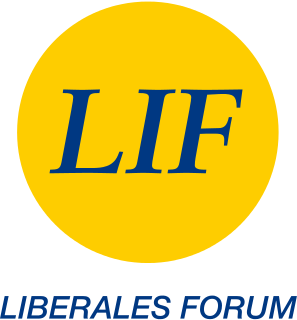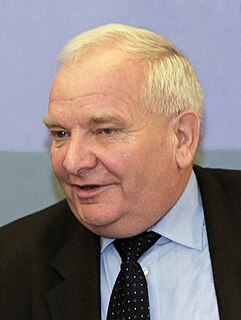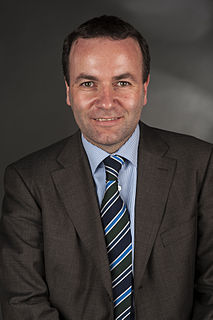
A Member of the European Parliament (MEP) is a person who has been elected to serve as a popular representative in the European Parliament.

The Austrian Green Party is a green political party in Austria.

The Liberal Forum was a liberal political party in Austria. The party was active from February 1993 to January 2014, when the party merged into NEOS – The New Austria. The party was a member of the Liberal International and the Alliance of Liberals and Democrats for Europe Party.

Elections to the European Parliament were held between 10 and 13 June 2004 in the 25 member states of the European Union, using varying election days according to local custom. The European Parliamental parties could not be voted for, but elected national parties aggregated in European Parliamental parties after the elections.

Richard Graham Corbett CBE is a former British politician who served as the final Leader of the European Parliamentary Labour Party (EPLP), from 2017 to 2020. He was a Member of the European Parliament (MEP) for Merseyside West from 1996 to 1999 and then for Yorkshire and the Humber from 1999 to 2009, when he lost his seat, and again from 2014 to 2020. He attended Shadow Cabinet meetings and was a member of the Labour Party's National Executive Committee.

David Martin is a Scottish politician who has served as co-convener of the Citizens' Assembly of Scotland since 2019. A member of the Scottish Labour Party, he was a Member of the European Parliament (MEP) from 1984 to 2019, having first represented the Lothians constituency until 1999 and then for the Scotland constituency. He was the United Kingdom's longest serving MEP and the second longest serving MEP in the whole European Parliament.
Hans-Peter Martin is an Austrian author and journalist and former politician who has been a Member of the European Parliament between 1999 and 2014.

Independence/Democracy (IND/DEM) was a Eurosceptic political group active during the 2004–2009 term of the European Parliament. The group was the successor to the Europe of Democracies and Diversities (EDD) group.

The Movement for Rights and Freedoms is a centrist political party in Bulgaria with a support base among ethnic minority communities.
Andrew Henry William Brons is a British politician and former MEP. Long active in far-right politics in Britain, he was elected as a Member of the European Parliament (MEP) for Yorkshire and the Humber for the British National Party (BNP) at the 2009 European Parliament election. He was the Chairman of the National Front in the early 1980s. He resigned the BNP whip in October 2012 and became patron of the British Democratic Party. He did not seek re-election in 2014.

Legislative elections were held in Austria on 1 October 2006 to elect the 23rd National Council, the lower house of Austria's bicameral parliament.

Elections to the European Parliament were held in the 27 member states of the European Union (EU) between 4 and 7 June 2009. A total of 736 Members of the European Parliament (MEPs) were elected to represent some 500 million Europeans, making these the biggest trans-national elections in history. An additional 18 observers were pre-elected.
The Hans-Peter Martin's List – For genuine control in Brussels was a populist and Eurosceptic political party in Austria. It had three seats in the European Parliament.

The European Parliament election of 2009 in Austria was the 2009 election of the delegation from Austria to the European Parliament. Austria will have 17 seats in the European Parliament, instead of the 18 that the country had before the re-allocation of seats.

The European Conservatives and Reformists (ECR) is a Eurosceptic, anti-federalist political group of the European Parliament. The ECR is the parliamentary group of the European Conservatives and Reformists Party European political party (formerly known as the Alliance of Conservatives and Reformists in Europe or Alliance of European Conservatives and Reformists, but also includes MEPs from four other European parties and thirteen MEPs without European party affiliation.

From 22 to 25 May 2014, elections to the European Parliament were held in the European Union.

The United Kingdom's component of the 2014 European Parliament election was held on Thursday 22 May 2014, coinciding with the 2014 local elections in England and Northern Ireland. In total, 73 Members of the European Parliament were elected from the United Kingdom using proportional representation. England, Scotland and Wales use a closed-list party list system of PR, while Northern Ireland used the single transferable vote (STV).

The 2014 European Parliament election was held on 25 May 2014 in Austria. As a result of the Lisbon Treaty Austria held 19 seats in the European Parliament, but with Croatia joining the Union in 2013, Austria's allocation was reduced to 18 seats.

The United Kingdom's component of the 2019 European Parliament election was held on Thursday 23 May 2019 and the results were announced on Sunday 26 and Monday 27 May 2019, after all the other EU countries had voted. This was the United Kingdom's final participation in a European Parliament election before leaving the European Union on 31 January 2020, and was also the last election to be held under the provisions of the European Parliamentary Elections Act 2002 before its repeal under the European Union (Withdrawal) Act 2018.

The 2019 European Parliament election in Denmark was held on 26 May 2019, and elected the Danish members to the European Parliament. The elections are part of the EU-wide elections for the parliament. Denmark has 13 seats in parliament, and which will be increased by one additional seat, once Brexit comes into force.

















